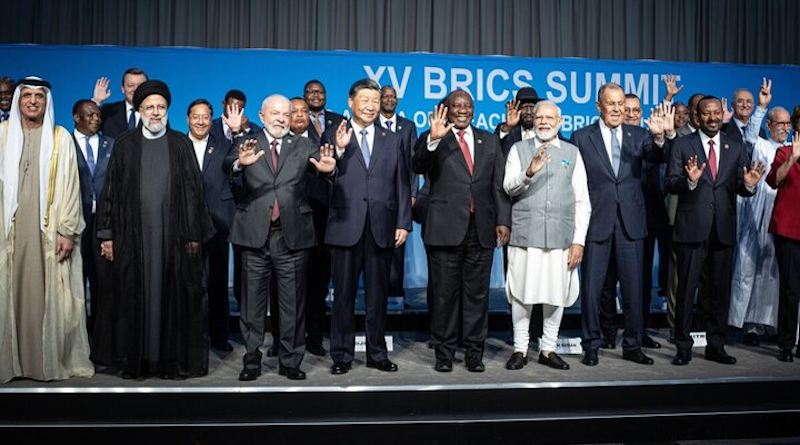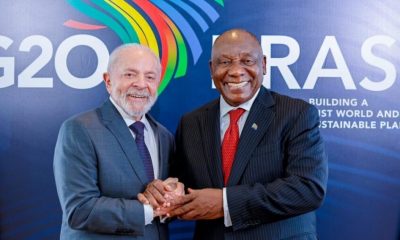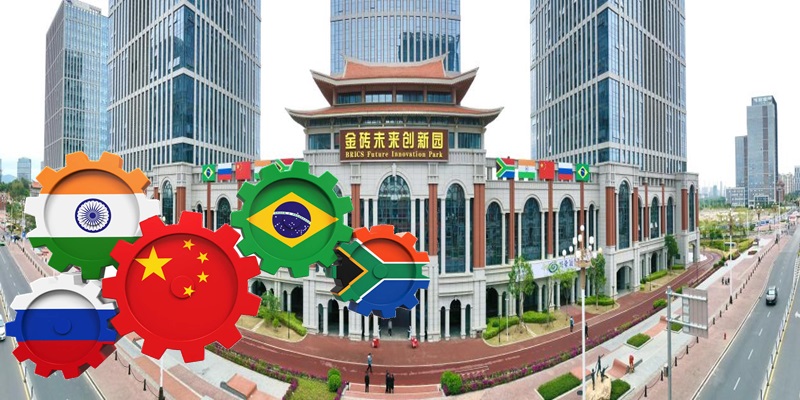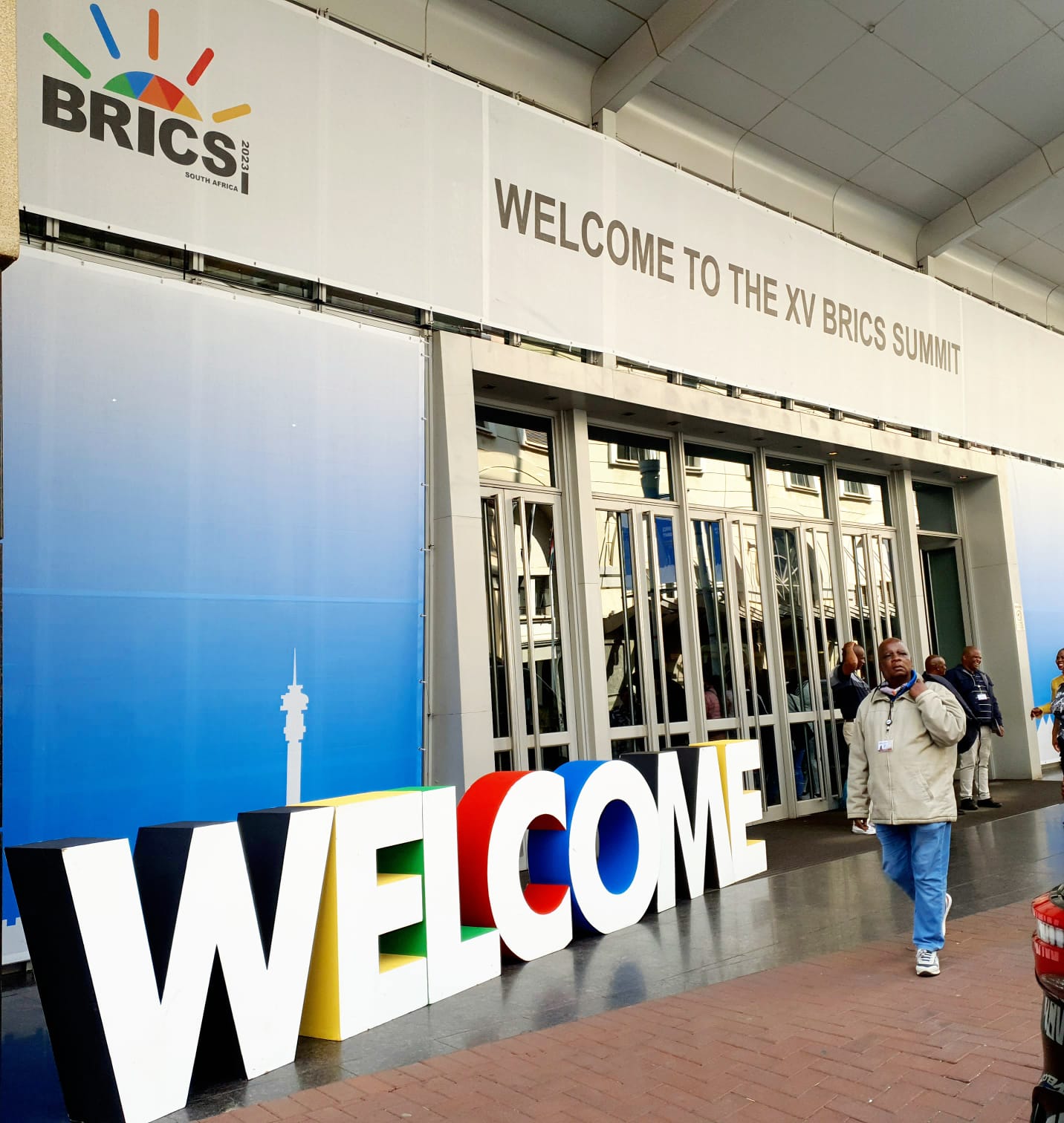World
Expanding BRICS for Numerical Strength or Ensuring Qualitative Geopolitical Influence

By Professor Maurice Okoli
As stipulated by the guidelines, Russia will take over BRICS [Brazil, Russia, India, China and South Africa] from January 2024. With the heightening of geopolitical tensions, Russia’s priority focus is on the group’s possible enlargement to counter U.S. hegemony. It plans to push seriously for critical reforms in the international financial architecture and create a solidified platform for building an equitable multipolar world order.
In the past few years, the BRICS group has taken a number of broad initiatives that aim at countering hegemonic policies and against the collective West for imposing the ‘rules of the game’ on the world majority. There have been explicit indications that Russia’s BRICS presidency from January 2024 will constitute another clear chance towards entering into forming alliances with Africa, Asia and Latin America.
Deputy Foreign Minister Sergey Ryabkov said in early October that BRICS had agreed on a list of candidates for partner-state status ahead of the upcoming summit in Kazan in 2024. According to Ryabkov, during the Russian BRICS chairmanship, special attention would be expanding the “circle of BRICS friends,” including in Latin America.
Many Latin American countries have expressed their desire to join the group. African countries, particularly Burkina Faso, Chad, Mali, Niger and Central African Republic have appeared on Russia’s list as potential members. In addition, Angola, Kenya, Nigeria, Senegal and Zimbabwe have appeared in media reports, striking membership deals with Russia, hoping to secure their ultimate accession to BRICS status during Russia’s chairmanship.
Currently, Russia is supporting African countries in their fight against trends of growing neocolonialism, forging close cooperation in preserving their sovereignty and political independence. Russia has persistently been confronting Europe and the United States over dominating and exploiting Africa. The relationship between China and Russia is strengthening. Nevertheless, China and Russia still have their approaches to some global issues. China promotes cooperation even with the United States, while Russia insists on confrontation. Creating divisions and partitions is simply not the right path to global peace and development. Why not attempt to reach ‘consensus’ – the catchword of BRICS? This fierce political confrontation is sharpening disunity across Africa, and impacting the prospects of the African Continental Trade Area [AfCFTA], the African Union’s flagship program under the Agenda 2063.
Despite the continental instability, African countries still seriously consider the traditional markets in the United States and Europe for their revenue products, and the recent Johannesburg summit witnessed in-depth discussions relating to new agreements between the AfCFTA and the African Growth and Opportunity Act [AGOA] which will presumably be extended for another 16 years, until 2041. It offers certain broad conditions as a stepping-stone to address regional and global challenges, especially for Africa’s young and entrepreneurial population. That expected leverage will strengthen trade relations with Africa.
South Africa and BRICS
South Africa has so far displayed pragmatism. It deals with global players without discriminating. Moreover, South Africa has adopted ‘neutrality’ and further taken non-aligned positions on many issues in its foreign policy, thus fulfilling the promise of strategically working on the bilateral relationship with all countries. Research establishes noticeable facts, for instance, that South Africa’s export trade to the United States, United Kingdom and the European Union account for a combined 35%, and with China around 9%. United States trade with South Africa totalled $25.5 billion in 2022. Exports were $9.3 billion; imports were $16.2 billion. Russia’s trade was $1.3 billion with South Africa in 2023.
With an estimated population of 58 million, South Africa [BRICS member] is the southernmost country in Africa. Energy deficit has crippled industrial operations and supplies for domestic use have largely been reduced. Social discontent, as a result of the multiple crises, has engulfed every corner of South Africa. The World Bank has approved a $1 billion loan to support South Africa’s energy sector which is currently experiencing worse conditions including inadequate funds for overhauling, renovation and upgrading.
At the end of the 15th BRICS summit held in South Africa, the leaders called for a more active use of national currencies in financial transactions as part of the adopted declaration. But the basic arguable question here remains that the well-established BRICS+ format and many new members joining BRICS in 2024 have, over a long period, had profitable trade ties with the United States and Europe.
For fresh members, it is the significance of trade and economic partnership between them and BRICS. In fact, balancing the economic interests of these African countries is as important for this sustainable world order as lasting peace and indivisible security. Therefore, Russia’s leadership has to provide that platform and step-by-step to advance their development-oriented aspirations and streamline the effective full-scale operational activity with BRICS.
Application process
Discussions about the expansion and entry of new members were little addressed until the early 2020s. The leaders and top-ranking diplomats of the founding bloc began the discussions for the expansion of the group, most often referring to 2010, the year South Africa joined after accepting an invitation from China. BRICS is the acronym composed of the first letters of the countries’ names in English. The term BRIC was originally coined in 2001 by Goldman Sachs economist Jim O’Neill at the University of Manchester, and with South Africa, it was renamed BRICS.
Until today, there is no formal application process as such to join BRICS, but any hopeful government must receive unanimous backing from all existing BRICS members – Brazil, Russia, India, China, and South Africa – to receive an invitation. In a rush to overcome Western imperialist-economic hegemony on the path of strengthening economic integration and developing economic activities, BRICS members, particularly Russia set to indiscriminately ask for applications it termed ‘friendly allies’ from around the world.
While sharing positive concerns for the group’s expansion, existing conflicting issues among new members have to be taken into serious account, as it may likely influence future genuine policy partnerships. The BRICS bloc has not set any concrete criteria, admission of new candidates is determined by a simple ‘consensus’ – a general agreement at the summit. But experts, as the situation over expansion is increasingly evolving, have beamed warning lights over indiscriminate admission of new members.
In August 2023, it was reported that more than 40 countries had shown interest in joining BRICS, including 22 that had formally applied to join. Historically, since 2017 it was China that insisted on promoting the BRICS+ format to attract a large number of non-participating countries to the organization. BRICS’ scope of activities has indeed widened to include issues relating to education and culture, health and living standards, science and technology, finance and politics. Now, of course, many appreciate others joining in building a partnership with BRICS. But now so frequently, and often asked – quality or quantity?
Monitoring various discussions and developments, Alexander Shokhin, head of the Russian Union of Industrialists and Entrepreneurs (RSPP), in early November suggested that BRICS countries should agree on the rules of the game ‘for the five’ before expanding the organization. The BRICS countries have not yet sufficiently formed a common economic policy, whose most important element should be a new monetary and financial system, in order to accept new countries into the organization.
“Considering BRICS as such an alternative [to the Western model of the global economy], to be honest, is that we have not succeeded in rendering BRICS an effective mechanism for forming new rules of global trade, payment and settlement relations, an alternative financial system, and so on, in order to have begun to engage in expansion,” Shokhin said at the plenary session of the International Financial University Forum.
“For me, it would be better for the five [countries] to develop the rules of the game, and to incorporate new members as members joining not the organization, but the rules of the game,” Shokhin added.
Shokhin noted that the process of coming to a consensus is difficult even with the current BRICS composition, “Even when talking about the interests of India and China in creating an alternative monetary and financial system, we see that this is not an easy matter.” In addition, it will be even more difficult to form common rules with such participants as Iran or Ethiopia.
“With the presence of Ethiopia, for example, Iran and a number of other countries, of course, it will be rather difficult to do [to develop new ‘rules of the game’]. In fact, it would be good for us to have Indonesia as a member of BRICS, because Indonesia is one of the examples of a growing economy, based on a combination of the old principles of inexpensive labour resources and technological progress, among other matters, on the latest technological solutions, including robotics, artificial intelligence, and so on,” Shokhin said, describing the preferred vector to expand BRICS.
“BRICS chairmanship should rather aim at trying to make maximum progress in forming the rules of the game within the organization, so that alternative systems could be proposed; and above all, of course, an alternative monetary and financial system, as well as a payment and settlement system,” Shokhin said, summarizing his position regarding the tasks facing BRICS.
Arguments for Expansion
According to Russia’s Ministry of Foreign Affairs, Africa should be an essential part of the BRICS expansion, and form the necessary part of the platform for dealing with growing neocolonialism in the continent. South Africa was considered as a conduit and entry point into Africa when it was admitted as the fifth member in 2010. Despite showing large-scale varying rates of economic development, and unresolved long-standing conflicts between them, Ethiopia and Egypt stand as new members on the recommendation by Russia backed by South Africa and China.
Minister of Foreign Affairs Yusuf Tuggar said in an interview with Bloomberg that Nigeria would seek to become a member of the BRICS group within the next two years as part of a new foreign policy push to have its voice heard in important global organizations.
Nigeria, Africa’s most populous nation, is seeking to assert its leadership role on the continent after years of playing a subordinate in international politics. “Nigeria has come of age to decide for itself who her partners should be and where they should be, being multiple aligned is in our best interest, and therefore it is necessary to transfer cooperation to a new strategic level on the globe,” Tuggar said.
“We need to belong to groups like BRICS, like the G-20 and all these other ones because if there’s a certain criterion, say the largest countries in terms of population and economy should belong, then why isn’t Nigeria part of it?” Tuggar said.
Nigerian President Bola Tinubu, who was invited to attend the G-20 summit in India in September, has said he would push to join as a permanent member. South Africa, the continent’s most industrialized nation, is already a member of the Group of 20 and joined BRICS in 2010, a year after it was formed.
South Sudan’s Ambassador to Moscow Chol Tong Mayay Jang also said that his country is studying the possibility of joining BRICS. The diplomat noted that “given the current geopolitical situation in the world, you see, there are many people who see that BRICS may be the best option.”
The envoy pointed out that “even most of the allies from the Middle East, allies of the West, have already expressed interest to join BRICS.” “Saudi Arabia, which is a very close ally to the US, is now a member of BRICS,” he stressed, adding: “It means that there is something, which is making people now seek a refuge.”
Before we even delve further into the complexity of the possibilities that could happen if those African countries listed to join BRICS, it is important to know what the BRICS agenda has for them or say simply as a show of solidarity, as reports indicated that Central African Republic (CAR) plans to submit an official application to BRICS. Russian Ambassador to the CAR Alexander Bikantov acknowledged in an interview that the CAR continues to develop its relations with the BRICS member states, both at the bilateral level and on various international platforms. “In August 2023, CAR President Faustin-Archange Touadera participated in the [15th] BRICS Summit in Johannesburg,” the diplomat noted. “Contacts were established with the International Alliance of BRICS Strategic Projects. As well, the joint intention for opening representative offices in Moscow and Bangui was declared.”
From various points of view, it is convincing to conclude that the aim of the latest irreversible expansion is touted as a large part of the plan for building a ‘multipolar’ world order that will definitely put weight on hitherto subdued voices of the Global South and brings them up to the centre of the world agenda. Russian President Vladimir Putin said at the St Petersburg International Cultural Forum – Forum of United Cultures on November 17 underlined this fact that the flexible admission of new members to the BRICS association presents an example of “how a compromise can and needs to be sought and achieved without imposing any viewpoint.”
“These are the organizational principles of BRICS, which is not a bloc, all the more so, it is not a military bloc but it creates conditions for achieving mutual understanding,” Putin underscored the principles for enrolling new members.
President Xi Jinping said at the extraordinary BRICS online summit on the Middle East in November that China, along with other BRICS members, would support Russia’s chairmanship of the organization next year. Xi described the BRICS cooperation mechanism as “an important platform for emerging markets and developing countries to strengthen unity and cooperation and safeguard common interests.”
At the Primakov Readings international forum held in late November, Foreign Minister Sergey Lavrov remarked the trends shaping the multipolar order are new realities. The unbalanced and unfair model of globalization is becoming a thing of the past. The emergence of new global development centres, the increasing self-awareness of many developing countries and their refusal to blindly follow former colonial powers.
Today, new players representing the Global South and Global East have stepped onto the international political stage. The geopolitical ambitions of the new global players are buttressed by their economic potential. Their numbers are growing, according to Lavrov, and to support his argument referred to President Vladimir Putin who said at the G20 extraordinary summit on November 22, that a “significant portion of global investment, trade and consumer activity is shifting to the Asian, African and Latin American regions, which are home to the majority of the world’s population.”
“Proceeding from the principles of equality and mutual respect, they are reaching a balance of interests via consensus. It’s no surprise that dozens of states want to get closer to BRICS. The number of BRICS members will double. Another 20 states have made similar inquiries or would like to establish special, privileged relations with this association. Next year, Russia will be chairing BRICS. We will do everything we can for BRICS to strengthen its stature in the international arena and to continue playing an increasingly greater role in creating a fair world arrangement,” underlined Lavrov at the Primakov Readings international forum, which is held yearly for politicians, diplomats, experts and academics, originally initiated since 2015.
Lavrov noted a bit earlier, in mid-Autumn, that “the weight, prestige and role of an individual candidate country and, of course, its position in the international arena” were taken into account in decision-making on accepting new members to expand BRICS. An updated list of candidate countries for BRICS membership will be prepared for consideration at the group’s next annual summit in Kazan under Russia’s one-year chairmanship.
South Africa holds the rotating presidency of BRICS until December 2023 and will pass it on to Russia. According to official sources, BRICS members [Brazil, Russia, India, China and South Africa] have decided to invite Argentina, Egypt, Ethiopia, Iran, Saudi Arabia and the United Arab Emirates to join as full-fledged members of the group from January 1, 2024.
Professor Maurice Okoli is a fellow at the Institute for African Studies and the Institute of World Economy and International Relations, Russian Academy of Sciences. He is also a fellow at the North-Eastern Federal University of Russia. He is an expert at the Roscongress Foundation and the Valdai Discussion Club.
As an academic researcher and economist with a keen interest in current geopolitical changes and the emerging world order, Maurice Okoli frequently contributes articles for publication in reputable media portals on different aspects of the interconnection between developing and developed countries, particularly in Asia, Africa and Europe. With comments and suggestions, he can be reached via email: markolconsult (at) gmail (dot) com
World
African Visual Art is Distinguished by Colour Expression, Dynamic Form—Kalalb

By Kestér Kenn Klomegâh
In this insightful interview, Natali Kalalb, founder of NAtali KAlalb Art Gallery, discusses her practical experiences of handling Africa’s contemporary arts, her professional journey into the creative industry and entrepreneurship, and also strategies of building cultural partnership as a foundation for Russian-African bilateral relations. Here are the interview excerpts:
Given your experience working with Africa, particularly in promoting contemporary art, how would you assess its impact on Russian-African relations?
Interestingly, my professional journey in Africa began with the work “Afroprima.” It depicted a dark-skinned ballerina, combining African dance and the Russian academic ballet tradition. This painting became a symbol of cultural synthesis—not opposition, but dialogue.
Contemporary African art is rapidly strengthening its place in the world. By 2017, the market was growing so rapidly that Sotheby launched its first separate African auction, bringing together 100 lots from 60 artists from 14 foreign countries, including Algeria, Ghana, Mali, Nigeria, Senegal, and others. That same year during the Autumn season, Louis Vuitton Foundation in Paris hosted a major exhibition dedicated to African art. According to Artnet, sales of contemporary African artists reached $40 million by 2021, a 434% increase in just two years. Today, Sotheby holds African auctions twice a year, and in October 2023, they raised $2.8 million.
In Russia, this process manifests itself through cultural dialogue: exhibitions, studios, and educational initiatives create a space of trust and mutual respect, shaping the understanding of contemporary African art at the local level.
Do you think geopolitical changes are affecting your professional work? What prompted you to create an African art studio?
The international context certainly influences cultural processes. However, my decision to work with African themes was not situational. I was drawn to the expressiveness of African visual language—colour, rhythm, and plastic energy. This theme is practically not represented systematically and professionally in the Russian art scene.
The creation of the studio was a step toward establishing a sustainable platform for cultural exchange and artistic dialogue, where the works of African artists are perceived as a full-fledged part of the global cultural process, rather than an exotic one.
To what extent does African art influence Russian perceptions?
Contemporary African art is gradually changing the perception of the continent. While previously viewed superficially or stereotypically, today viewers are confronted with the depth of artistic expression and the intellectual and aesthetic level of contemporary artists.
Portraits are particularly impactful: they allow us to see not just an abstract image of a “continent,” but a concrete personality, character, and inner dignity. Global market growth data and regular auctions create additional trust in African contemporary art and contribute to its perception as a mature and valuable movement.
Does African art reflect lifestyle and fashion? How does it differ from Russian art?
African art, in my opinion, is at its peak in everyday culture—textiles, ornamentation, bodily movement, rhythm. It interacts organically with fashion, music, interior design, and the urban environment. The Russian artistic tradition is historically more academic and philosophical. African visual art is distinguished by greater colour expression and dynamic form. Nevertheless, both cultures are united by a profound symbolic and spiritual component.
What feedback do you receive on social media?
Audience reactions are generally constructive and engaging. Viewers ask questions about cultural codes, symbolism, and the choice of subjects. The digital environment allows for a diversity of opinions, but a conscious interest and a willingness to engage in cultural dialogue are emerging.
What are the key challenges and achievements of recent years?
Key challenges:
- Limited expert base on African contemporary art in Russia;
- Need for systematic educational outreach;
- Overcoming the perception of African art as exclusively decorative or ethnic.
Key achievements:
- Building a sustainable audience;
- Implementing exhibition and studio projects;
- Strengthening professional cultural interaction and trust in African
contemporary art as a serious artistic movement.
What are your future prospects in the context of cultural diplomacy?
Looking forward, I see the development of joint exhibitions, educational programs, and creative residencies. Cultural diplomacy is a long-term process based on respect and professionalism. If an artistic image is capable of uniting different cultural traditions in a single visual space, it becomes a tool for mutual understanding.
World
Ukraine Reveals Identities of Nigerians Killed Fighting for Russia

By Adedapo Adesanya
The Ukrainian Defence Intelligence (UDI) has identified two Nigerian men, Mr Hamzat Kazeem Kolawole and Mr Mbah Stephen Udoka, allegedly killed while fighting as Russian mercenaries in the war between the two countries ongoing since February 2022.
The development comes after Russia denied knowledge of Nigerians being recruited to fight on the frontlines.
Earlier this week, the Russian Ambassador to Nigeria, Mr Andrey Podyolyshev, said in Abuja that he was not aware of any government-backed programme to recruit Nigerians to fight in the war in Ukraine.
He said if at all such activity existed, it is not connected with the Russian state.
However, in a statement on Thursday, the Ukrainian Defence released photographs of Nigerians killed while defending Russia.
“In the Luhansk region, military intelligence operatives discovered the bodies of two citizens of the Federal Republic of Nigeria — Hamzat Kazeen Kolawole (03.04.1983) and Mbah Stephen Udoka (07.01.1988),” the statement read.
According to the statement, both men served in the 423rd Guards Motor Rifle Regiment (military unit 91701) of the 4th Guards Kantemirovskaya Tank Division of the armed forces of the Russian Federation.
UDI said that they signed contracts with the Russian Army in the second half of 2025 – the deceased Mr Kolawole on August 29 and Mr Udoka on September 28.
“Udoka received no training whatsoever — just five days later, on October 3, he was assigned to the unit and sent to the temporarily occupied territories of Ukraine,” the report read.
It added that no training records for Mr Kolawole have been preserved; however, it is highly likely that he also received no military training, but his wife and three children remain in Nigeria.
Both Nigerians, the report added, were killed in late November during an attempt to storm Ukrainian positions in the Luhansk region.
“They never engaged in a firefight — the mercenaries were eliminated by a drone strike,” UDI stated, warning foreign citizens against travelling to the Russian Federation or taking up any work on the territory of the “aggressor state”.
“A trip to Russia is a real risk of being forced into a suicide assault unit and, ultimately, rotting in Ukrainian soil,” the statement read.
In an investigation earlier this month, CNN reported that hundreds of African men have been enticed to fight for Russia in Ukraine with the promise of civilian jobs and high salaries. However, the media organisation uncovered that they are being deceived or sent to the front lines with little combat training.
CNN said it reviewed hundreds of chats on messaging apps, military contracts, visas, flights and hotel bookings, as well as gathering first-hand accounts from African fighters in Ukraine, to understand just how Russia entices African men to bolster its ranks.
World
Today’s Generation of Entrepreneurs Value Flexibility, Autonomy—McNeal-Weary

By Kestér Kenn Klomegâh
The Young African Leaders Initiative (YALI) is the United States’ signature step to invest in the next generation of African leaders. Since its establishment in 2010 by Obama administration, YALI has offered diverse opportunities, including academic training in leadership, governance skills, organizational development and entrepreneurship, and has connected with thousands of young leaders across Africa. This United States’ policy collaboration benefits both America and Africa by creating stronger partnerships, enhancing mutual prosperity, and ensuring a more stable environment.
In our conversation, Tonya McNeal-Weary, Managing Director at IBS Global Consulting, Inc., Global Headquarters in Detroit, Michigan, has endeavored to discuss, thoroughly, today’s generation of entrepreneurs and also building partnerships as a foundation for driving positive change and innovation in the global marketplace. Here are the excerpts of her conversation:
How would you describe today’s generation of entrepreneurs?
I would describe today’s generation of entrepreneurs as having a digital-first mindset and a fundamental belief that business success and social impact can coexist. Unlike the entrepreneurs before them, they’ve grown up with the internet as a given, enabling them to build global businesses from their laptops and think beyond geographic constraints from day one. They value flexibility and autonomy, often rejecting traditional corporate ladders in favor of building something meaningful on their own terms, even if it means embracing uncertainty and financial risk that previous generations might have avoided.
And those representing the Young African Leaders Initiative, who attended your webinar presentation late January 2026?
The entrepreneurs representing the Young African Leaders Initiative are redefining entrepreneurship on the continent by leveraging their unique perspectives, cultural heritage, and experiences. Their ability to innovate within local contexts while connecting to global opportunities exemplifies how the new wave of entrepreneurs is not confined by geography or conventional expectations.
What were the main issues that formed your ‘lecture’ with them, Young African Leaders Initiative?
The main issues that formed my lecture for the Young African Leaders Initiative were driven by understanding the importance of building successful partnerships when expanding into the United States or any foreign market. During my lecture, I emphasized that forming strategic alliances can help entrepreneurs navigate unfamiliar business environments, access new resources, and foster long-term growth. By understanding how to establish strong and effective partnerships, emerging leaders can position their businesses for sustainable success in global markets. I also discussed the critical factors that contribute to successful partnerships, such as establishing clear communication channels, aligning on shared goals, and cultivating trust between all parties involved. Entrepreneurs must be proactive in seeking out partners who complement their strengths and fill gaps in expertise or resources. It is equally important to conduct thorough due diligence to ensure that potential collaborators share similar values and ethical standards. Ultimately, the seminar aimed to empower YALI entrepreneurs with practical insights and actionable strategies for forging meaningful connections across borders. Building successful partnerships is not only a pathway to business growth but also a foundation for driving positive change and innovation in the global marketplace.
What makes a ‘leader’ today, particularly, in the context of the emerging global business architecture?
In my opinion, a leader in today’s emerging global business architecture must navigate complexity and ambiguity with a fundamentally different skill set than what was previously required. Where traditional leadership emphasized command-and-control and singular vision, contemporary leaders succeed through adaptive thinking and collaborative influence across decentralized networks. Furthermore, emotional intelligence has evolved from a soft skill to a strategic imperative. Today, the effective modern leader must possess deep cross-cultural intelligence, understanding that global business is no longer about exporting one model worldwide but about genuinely integrating diverse perspectives and adapting to local contexts while maintaining coherent values.
Does multinational culture play in its (leadership) formation?
I believe multinational culture plays a profound and arguably essential role in forming the kind of leadership required in today’s global business environment. Leaders who have lived, worked, or deeply engaged across multiple cultural contexts develop a cognitive flexibility that’s difficult to replicate through reading or training alone. More importantly, multinational exposure tends to dismantle the unconscious certainty that one’s own way of doing things is inherently “normal” or “best.” Leaders shaped in multicultural environments often develop a productive discomfort with absolutes; they become more adept at asking questions, seeking input, and recognizing blind spots. This humility and curiosity become strategic assets when building global teams, entering new markets, or navigating geopolitical complexity. However, it’s worth noting that multinational experience alone doesn’t automatically create great leaders. What matters is the depth and quality of cross-cultural engagement, not just the passport stamps. The formation of global leadership is less about where someone has been and more about whether they’ve developed the capacity to see beyond their own cultural lens and genuinely value differences as a source of insight rather than merely tolerating them as an obstacle to overcome.
In the context of heightening geopolitical situation, and with Africa, what would you say, in terms of, people-to-people interaction?
People-to-people interaction is critically important in the African business context, particularly as geopolitical competition intensifies on the continent. In this crowded and often transactional landscape, the depth and authenticity of human relationships can determine whether a business venture succeeds or fails. I spoke on this during my presentation. When business leaders take the time for face-to-face meetings, invest in understanding local priorities rather than imposing external agendas, and build relationships beyond the immediate transaction, they signal a different kind of partnership. The heightened geopolitical situation actually makes this human dimension more vital, not less. As competition increases and narratives clash about whose model of development is best, the businesses and nations that succeed in Africa will likely be those that invest in relationships characterized by reciprocity, respect, and long-term commitment rather than those pursuing quick wins.
How important is it for creating public perception and approach to today’s business?
Interaction between individuals is crucial for shaping public perception, as it influences views in ways that formal communications cannot. We live in a society where word-of-mouth, community networks, and social trust areincredibly important. As a result, a business leader’s behavior in personal interactions, their respect for local customs, their willingness to listen, and their follow-through on commitments have a far-reaching impact that extends well beyond the immediate meeting. The geopolitical dimension amplifies this importance because African nations now have choices. They’re no longer dependent on any single partner and can compare approaches to business.
From the above discussions, how would you describe global business in relation to Africa? Is it directed at creating diverse import dependency?
While it would be too simplistic to say global business is uniformly directed at creating import dependency, the structural patterns that have emerged often produce exactly that outcome, whether by design or as a consequence of how global capital seeks returns. Global financial institutions and trade agreements have historically encouraged African nations to focus on their “comparative advantages” in primary commodities rather than industrial development. The critical question is whether global business can engage with Africa in ways that build productive capacity, transfer technology, develop local talent, and enable countries to manufacture for themselves and for export—or whether the economic incentives and power irregularities make this structurally unlikely without deliberate policy intervention.
-

 Feature/OPED6 years ago
Feature/OPED6 years agoDavos was Different this year
-
Travel/Tourism10 years ago
Lagos Seals Western Lodge Hotel In Ikorodu
-

 Showbiz3 years ago
Showbiz3 years agoEstranged Lover Releases Videos of Empress Njamah Bathing
-

 Banking8 years ago
Banking8 years agoSort Codes of GTBank Branches in Nigeria
-

 Economy3 years ago
Economy3 years agoSubsidy Removal: CNG at N130 Per Litre Cheaper Than Petrol—IPMAN
-

 Banking3 years ago
Banking3 years agoSort Codes of UBA Branches in Nigeria
-

 Banking3 years ago
Banking3 years agoFirst Bank Announces Planned Downtime
-

 Sports3 years ago
Sports3 years agoHighest Paid Nigerian Footballer – How Much Do Nigerian Footballers Earn



















